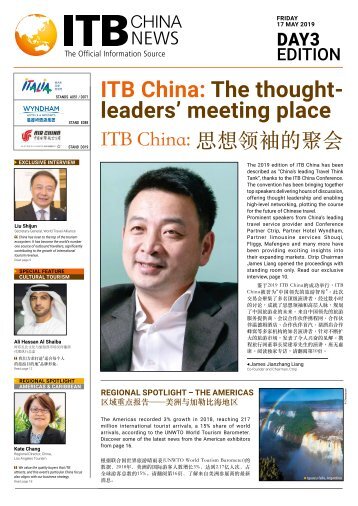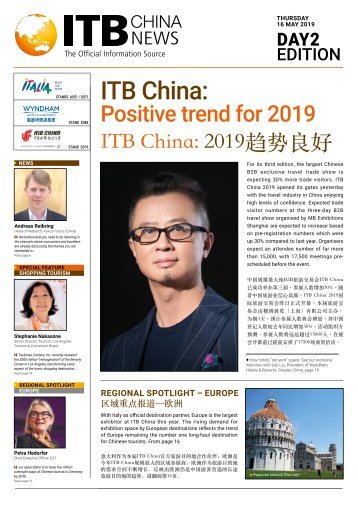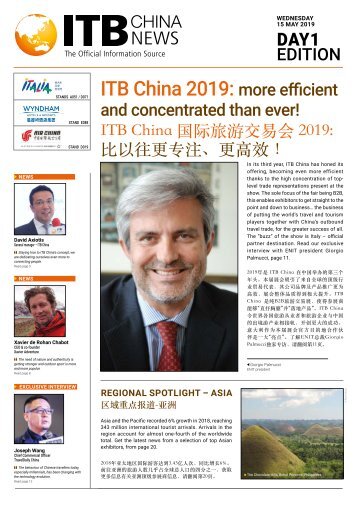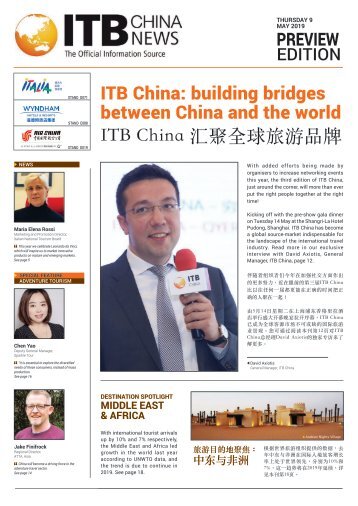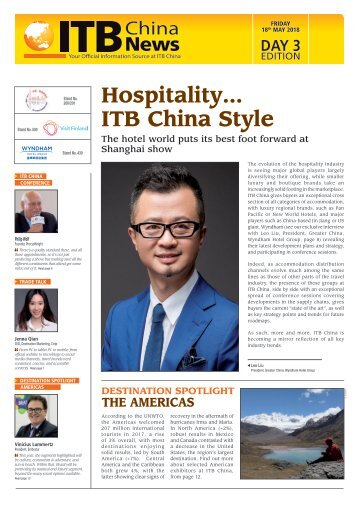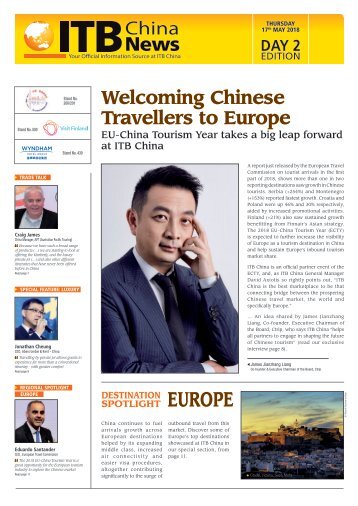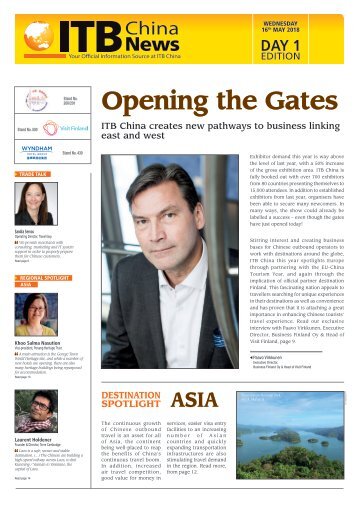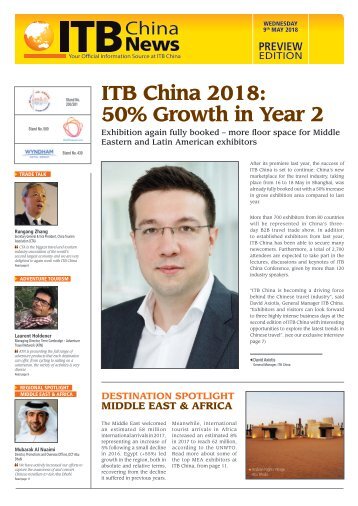ITB China News 2018 - Day 3 Edition
- Text
- Tourism
- Wyndham
- Marketing
- Destination
- Dhabi
- Brazil
- Brands
- Cultural
- Hotels
- Channels
6 ITB
6 ITB CHINA CONFERENCE East-West Exchange EU-China Tourism Year Under Spotlight Philip C. Wolf Founder, PhocusWright PHILIP WOLF ON ITB CHINA Philip C. Wolf, host of the EU-China panel at this year’s ITB China event, has a long background with ITB, dating back to his time at the helm of PhocusWright. We asked him what his thoughts were about this year’s edition of the show in China. This year’s growth in exhibition space of over 50% year-on-year is exceptional. But ITB’s organisers, Messe Berlin, have a certain way of running trade shows. There’s a quality standard there, and all these appointments, so it’s not just producing a show, but making sure all the different constituents that attend get some value out of it. As ITB China is an official partner of the EU-China Tourism Year, the topic has very much been under the spotlight over the past couple of days. On Day One of the show, Philip C. Wolf, founder of Phocuswright, moderated a conference on the topic, attended by five high ranking officials from different sectors: • Yiyi Jiang, Head of International Tourism Research, China Tourism Academy • Raimonds Aleksejenko, Deputy State Secretary, Ministry of Economics of the Republic of Latvia • Bojan Pavlek, First Secretary, EU Delegation to China • Paavo Virkkunen, Executive Director, Business Finland Oy & Head of Visit Finland • And Pierre Coenegrachts, Deputy Director, Wallonia Belgium Tourism Board One of the biggest obstacles to the growth of Chinese tourist numbers into Europe is that of visa issuance – a topic addressed by the panel. Bojan Pavlek said he believed more visa centres around China, where Chinese citizens could place their applications, would help the situation, adding, “This would of course lower the cost for visas and the time required for visas.” Raimonds Aleksejenko said he believed relieving the issue will take time, but there are ways to move forward. “We are working with Alibaba Group. It is not about legislation. It’s about user experience. And with a partner like Alibaba, they do a lot of work instead of the client.” Aleksejenko went on to explain that the use of Chinese payment systems such as Alipay is important, especially for small destinations. Paavo Virkkunen said that “Convenience and ease are those words we are all craving for. Convenience and ease in visa issues, in payment methods, in connectivity, in combinability. I think those are the elements we really need, to create new creative digital platforms, which will ease our work and life very much.” Pierre Coenegrachts said that in Belgium, his organisation is working with partners to implement the Chinese WeChat payment system: “More and more, maybe we will come to WeChat payments in Europe.” Can the ECTY really going to make a difference? According to Bojan Pavlek, “It’s just a start. It has to be seen as a kickoff, as a platform, to gather all the actors in the tourism industry, to make a European market more attractive to Chinese people, but also not to forget an important fact, and that’s sustainability of tourism. The whole idea is to have this discussion about how to attract Chinese tourists and vice-versa. Where can we find synergies, and also, basically, that the industry itself engages and also adapts to the market” The session you moderated was about EU-China relations, and the EU-China Year. What was the upshot of this? Only 2% of Europe’s inbound international travellers come from China. So, it really begs the question. It’s kind of like unemployment. Is there a natural growth rate of Chinese tourists to Europe? And then how much of a catalyst will this really be? Because every other country in the world is trying to lure these tourists. From my perspective, it’s really interesting, because there is this healthy global competition for international travellers, especially from China. As the Asian economies prosper, that means more outbound travellers. Travel and tourism is like one of the world’s great balancing acts. Every issue is involved, from raw census practicalities, the economy, you need to be of a certain income level before you can travel, then you have the politics, the visas, environmental issues, capacity issues… it’s really like “the great equaliser” ITB CHINA NEWS • Friday 18 th May 2018 www.itb-china-news.com
TRADE TALK 7 The Art and Science of Destination Marketing Jenna Qian is CEO of Destination Marketing at Ctrip, leading a business that connects destinations with people. We asked Ms Qian how destination marketing is changing over time, and what is important when marketing towards Chinese travellers. Chinese millennials are becoming the new force in China’s tourism. This massive group has a unique media consumption pattern. From PC to tablet PC to mobile; from official website to microblogs to social media channels, travel brands need consistent, concise, and accessible contents. Mobile internet has already surpassed TV in amount of time spent, and it is still growing rapidly. You talk about the “art and science” of Destination Marketing. What do you mean by that? The art & science is of equal significance to Destination Marketing. Though the marketing method varies, the logic and scientific analysis system behind marketing are unchanged. Through scientific analysis, we get a better understanding of target groups, their consumption preferences, and as a result, build strategy to have full marketing penetration on travellers’ decision and behaviour before, during and after the trip. Here I would like to share an example: Ctrip’s marketing project with Peru. The first stage is branding & FROM OFFICIAL WEBSITE TO MICROBLOGS TO SOCIAL MEDIA CHANNELS, TRAVEL BRANDS NEED CONSISTENT, CONCISE, AND ACCESSIBLE CONTENTS Jenna Qian CEO of Destination Marketing, Ctrip awareness. Through PC and mobile landing page, Ctrip website advertisements, social media posting, and KOL sharing, beautiful images are displayed in ways that make the destination immediately desirable. The second stage is sales conversion. Ctrip leverages its large membership and corporate partnerships to precisely reach the target audience. Taking into account differences in purchasing power, interests, demographic information, browsing history and more, we push relevant travel product to each potential tourist, and heighten sales conversion. The last stage is maintenance. After the initial launch, we assembled a Peru Online Flagship Store that incorporated tourism info, travel products, multimedia content, and sales functions in one place to create an interface that collages all relevant tourism-related information together. From scenic spots to hotels to restaurants, visitors can visually experience and instantly make purchasing decisions ON THE NEW DYNAMICS OF HOTEL DISTRIBUTION The consolidation of OTA giants has centralised the distribution channels for hotels, which are not only investing heavily in direct bookings but are also looking for new marketing channels. So, which marketing channels have the most potential for growth? How would WeChat Mini Programs, short videos, blockchain and other new technologies change the marketing channels for hoteliers? These were just some of the questions addressed at yesterday’s ITB China Conference session entitled, “The New Dynamics of Hotel Distribution”. One of the panellists, Andrew Hughes, Regional Director Hotel Sourcing of Hotelbeds Group someone who has been involved in travel and hospitality in various roles for over 20 years. We asked Andrew what he thinks of the distribution landscape at the moment. The distribution landscape is constantly evolving, though now it’s moving at a pace at which few can keep up. There are so many developments, we’d take days to cover them, though two stand out at the moment. Firstly, consolidation is occurring and will continue to occur, largely driven through the desire of hoteliers and B2B clients to leverage partners’ technology to optimize their business. Secondly, there’s increased pressure on intermediaries to demonstrate value in the supply chains, as well as the clear ability to influence clients to preference certain partners over others. It’s also no longer enough to have strong data available, intermediaries and travel companies need to demonstrate the ability to turn the data into commercial outcomes. What are your thoughts about the initiative by ITB to start the show here in China last year, aiming for the outbound market? China is such an exciting market, especially seeing the growth of Fully Independent Travellers (FITs) from across the whole country, not just major gateways. ITB is an ideal platform for us to engage suppliers and clients who access this outbound market and forms a part of our extensive range of actions planned for the coming year in China Andrew Hughes Regional Director Hotel Sourcing, Hotelbeds Group ITB CHINA NEWS • Friday 18 th May 2018
- Page 1: China Your Official Information Sou
- Page 5: NEWS 5 © Messe Berlin ITB CHINA CO
- Page 9 and 10: 9 我 们 将 联 合 战 略 伙
- Page 11 and 12: SPECIAL FEATURE CULTURAL TOURISM 11
- Page 13 and 14: AMERICAS REGION 13 Vinícius Lummer
- Page 15: AMERICAS REGION HALL PLAN 展 馆
Inappropriate
Loading...
Mail this publication
Loading...
Embed
Loading...


